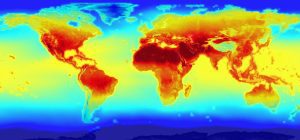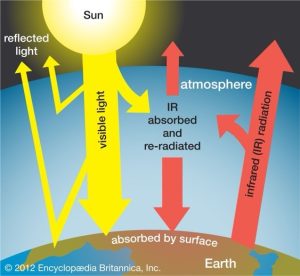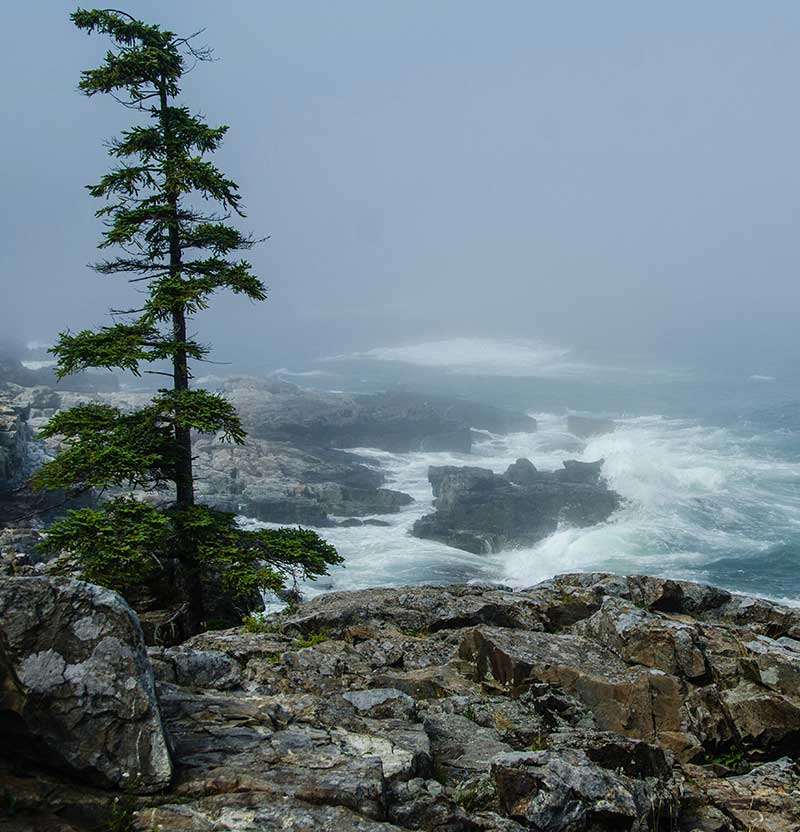Climate Topics Information

Earth’s climate has changed many times over the course of the planet’s history, ranging from ice ages to long periods of intense heat. Until now, these changes have occurred in response to natural events, like volcanic eruptions or variations in the amount of energy produced by the sun. However, in the 18th century, during the time of the Industrial Revolution, human activities began to significantly contribute to a worldwide warming trend. People began to burn and rely more on fossil fuels, such as coal and oil, and deforest the land at rates unprecedented in Earth’s history.1 These activities have changed the composition of the atmosphere and are therefore changing Earth’s climate at accelerated rates.
Climate change is a complex problem stemming from unsustainable policies and practices in almost every corner of the world. Yet the basic science behind climate change is quite simple. The sun radiates vast amounts of energy onto Earth. Most of the energy bounces off the surface of the planet and returns to space. But some of the energy is trapped by greenhouses gases (GHGs), like carbon dioxide and methane, which form a sort of buffer around the planet. The heat-trapping effect, known as the greenhouse effect, is vital for life to exist because it keeps the planet at livable temperatures for all current species. Without greenhouse gases, the planet would be far too cold to inhabit.2 Therefore, greenhouse gases are not inherently bad, but the high amount in the atmosphere has disturbed the natural balance, leading to the changing climate we see today.
 Naturally occurring levels of greenhouse gases allow life to flourish on Earth, from. Yet over the past two centuries, certain human activities have caused an overabundance to build up in the atmosphere. Major greenhouse gases contributing to climate change include carbon dioxide, methane, nitrous oxide, sulfur oxide, and water vapor. Countless human activities, like transportation, livestock management, and agriculture, contribute more greenhouse gases to the atmosphere every year.
Naturally occurring levels of greenhouse gases allow life to flourish on Earth, from. Yet over the past two centuries, certain human activities have caused an overabundance to build up in the atmosphere. Major greenhouse gases contributing to climate change include carbon dioxide, methane, nitrous oxide, sulfur oxide, and water vapor. Countless human activities, like transportation, livestock management, and agriculture, contribute more greenhouse gases to the atmosphere every year.
The current concentration of CO2 in the atmosphere is measured daily by the National Oceanic and Atmospheric Administration (NOAA), and as of July 2024 is around 425 PPM (parts per million) compared to 280 PPM before the Industrial Revolution.3 The increased concentration of CO2 around the world has led to rising ocean and atmospheric temperatures, and countless other associated effects. The average surface temperature of the Earth has risen nearly 1.5°C from pre-industrial levels.4 Considering that this is a global average, some places are experiencing much higher levels of warming, most notably the Arctic, where temperatures have increased nearly 3°C since 1980.5
Climate models and projections can predict how global average temperatures will increase in the future. Models produce different scenarios based on how much is expected to be emitted, and when or if the world will achieve carbon neutrality. Given these different projections, global average temperature is expected to increase anywhere between 1.0°C and 14.1°C from pre-industrial levels by 2100.6 Our actions today will determine where the global average increase falls, and how we as species can adapt to the change.
- EPA. (April 2023). Causes of Climate Change. EPA. Available online from: https://www.epa.gov/climatechange-science/causes-climate-change [accessed July 6, 2023].
- EPA. (August 2022). Basics of Climate Change. EPA. Available online from: https://www.epa.gov/climatechange-science/basics-climate-change [accessed July 6, 2023].
- Ibid.
- McGrath, M. (May 2023). Global Warming Set to Break 1.5C Limit for First Time. BBC News. Available online from: https://www.bbc.com/news/science-environment-65602293 [accessed July 6, 2023].
- Bamber, J. (August 2022). The Arctic is Warming Nearly Four Times Faster Than the Rest of the World. PBS. Available online from: https://www.pbs.org/newshour/politics/the-arctic-is-warming-nearly-four-times-faster-than-the-rest-of-the-world [accessed July 6, 2023].
- Lee, J.-Y., J. Marotzke, G. Bala, L. Cao, S. Corti, J.P. Dunne, F. Engelbrecht, E. Fischer, J.C. Fyfe, C. Jones, A. Maycock, J. Mutemi, O. Ndiaye, S. Panickal, and T. Zhou, 2021: Future Global Climate: Scenario-Based Projections and Near-Term Information. In Climate Change 2021: The Physical Science Basis. Contribution of Working Group I to the Sixth Assessment Report of the Intergovernmental Panel on Climate Change [Masson-Delmotte, V., P. Zhai, A. Pirani, S.L. Connors, C. Péan, S. Berger, N. Caud, Y. Chen, L. Goldfarb, M.I. Gomis, M. Huang, K. Leitzell, E. Lonnoy, J.B.R. Matthews, T.K. Maycock, T. Waterfield, O. Yelekçi, R. Yu, and B. Zhou (eds.)]. Cambridge University Press, Cambridge, United Kingdom and New York, NY, USA, pp. 553–672, doi: 10.1017/9781009157896.006./ [accessed July 6, 2023].
While the Western-science approach can be valuable in restoration efforts, it isn’t the only lens through which to view traditional knowledge. “The four-legged, the winged, the finned—we call them our brothers and sisters of the earth.” — Deborah Parker, former Tulalip Vice Chairwoman
CONNECT WITH US
Nikki Cooley
Co-Director
Nikki.Cooley@nau.edu
Karen Cozzetto
Manager
Karen.Cozzetto@nau.edu
Your tax deductible donation supports ITEP’s programming efforts.
Please contact us if you would like to contribute to our endowment or for any additional information regarding donations.


